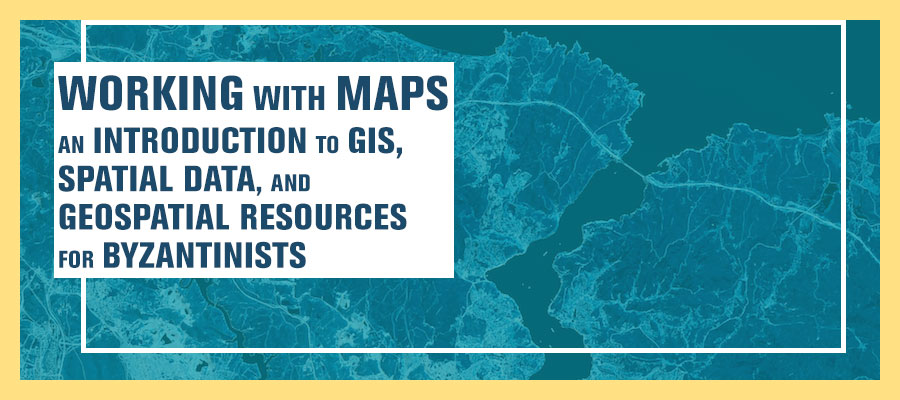Working with Maps: An Introduction to GIS, Spatial Data, and Geospatial Resources for Byzantinists
This online workshop will offer Byzantinists an introduction to Geographic Information Systems (GIS) and its potential applications in Byzantine studies. Participants will learn how to work with geospatial data, how to organize it, where to find it, and how to create their own. Working in QGIS, a free and open-source GIS desktop software package, students will learn how to visualize geographic information and create their own maps. Sessions will cover the basics of GIS and using QGIS: data and file types, installing QGIS and adding plugins, coordinate reference systems, displaying and working with vector and raster data, performing vector-based spatial queries, using the QGIS Layout Editor to create a static map, and georeferencing an analog map to be used in analyses or as a basemap. This material will be complemented by sessions touching on cartography and geography—critical approaches to cartography, principles of effective map design, the intersection of geography and historical studies—linked open data, digital gazetteers, publishing maps for print and web applications, mapping resources, and data sharing repositories for making data accessible, as well as introductions to the web-based applications ArcGIS StoryMaps and Recogito.
This workshop is intended for those who have very little or no experience with GIS.
Course Outline
- Monday, May 15, 2023, 11:00 am–1:00 pm & 2:00–4:00 pm ( EDT): The Basics of Geospatial Data: Getting started with GIS. Data types, organization, and creation. Linked open data. Digital gazetteers .
- Tuesday, May 16, 2023, 11:00 am–1:00 pm & 2:00–4:00 pm ( EDT): How Not to Lie with Maps: Effective map design. Coordinate reference systems. Vector-based spatial queries .
- Wednesday, May 17, 2023, 11:00 am–1:00 pm & 2:00–4:00 pm ( EDT): Making and Sharing a Map: Georeferencing. The QGIS Layout Editor. Publishing and data sharing.
- Thursday, May 18, 2023, 11:00 am–1:00 pm & 2:00–4:00 pm ( EDT): State of the Field: What are the possibilities? Find resources. Geography meets historical studies. ArcGIS StoryMaps and Recogito. Troubleshoot your own research and data.
Time Commitment & Prerequisites
- The time commitment for this workshop is 16 hours of instruction and an additional 30 minutes to an hour between sessions for practice exercises and preparation for following session. Participants are required to attend all sessions.
Workshop Checklist
- Computer capable of running QGIS. QGIS is available for Windows, Mac, and Linux computers. Basic requirements include 1 GB of disk space and at least 8 GB RAM.
- Stable internet connection.
- Laptop users will find a mouse useful.
The workshop is limited to 15 participants. Registration is first come, first served. REGISTRATION IS CLOSED.
Who is eligible?
- Graduate students and early career researchers (PhD received after May 2015) in the field of Byzantine studies. Students enrolled in graduate programs in North America and early career researchers working in North America will be given priority. Graduate students and early career researchers outside of North America will be placed on a waiting list and contacted if space is available.
- All participants must be BSANA members. BSANA membership is free for graduate students and early-career contingent scholars who have earned their PhD within the last eight years and who do not hold a permanent or tenure-track appointment. If you are not already a BSANA member, please complete the BSANA Membership Form before registering for the workshop. Your membership status will be confirmed before your space in the workshop is confirmed.
This workshop is part of the partnership between the Mary Jaharis Center for Byzantine Art and Culture and the Byzantine Studies Association of North America to provide digital humanities training opportunities to graduate students and early career researchers.
